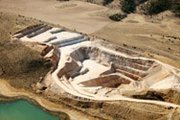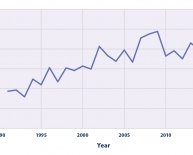
Florida Environmental Protection Agency
 An aerial view of an open-pit phosphate mine. The U.S. Environmental Protection Agency is walking away from an area in central Florida where it had raised fears that residents living on top of former mines were being exposed to dangerous radiation levels. (Shutterstock/B. Brown)
An aerial view of an open-pit phosphate mine. The U.S. Environmental Protection Agency is walking away from an area in central Florida where it had raised fears that residents living on top of former mines were being exposed to dangerous radiation levels. (Shutterstock/B. Brown)
The Environmental Protection Agency is walking away after a decades-long battle with Florida politicians and industry officials over cleaning up phosphate-mining waste in an area that could expose more than 100, 000 residents to cancer-causing radiation levels.
Under a decision quietly finalized two weeks ago, the federal agency will leave it to state officials to decide the fate of the sites in and around Lakeland, an approximately 10-square-mile residential area midway between Orlando and Tampa.
However, Florida officials have long argued that the affected area need not be cleaned up in the absence of radiation levels well above what EPA policy would normally permit. The decision not to enforce the usual federal rules could have far-reaching implications for how the United States deals with future radioactive contamination anywhere across the country - regardless of whether it is caused by conventional industrial activities or illicit radiological weapons, critics say.
In a joint statement to Global Security Newswire, the Florida health and environment departments say they have no plans to examine the sites further, despite prior recommendations by federal officials that an aerial radiation survey of the area is needed. The state officials say they already have enough historical data pertaining to the sites, and that additional monitoring is not necessary.
The statement, provided to GSN by Florida environmental protection spokeswoman Mara Burger, suggests the EPA decision not to clean up the sites under its Superfund program indicated that the federal agency did not consider the Lakeland area "problematic" from a public health standpoint.
Under Superfund law, the federal agency is authorized to remediate contaminated sites that pose a threat to public health and the environment.
Internal documents released under the Freedom of Information Act in recent years show, however, that the federal agency's lack of action was the result of state and industry opposition, and that EPA officials did in fact believe the sites could pose a serious public health threat.






















